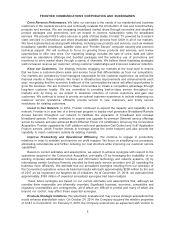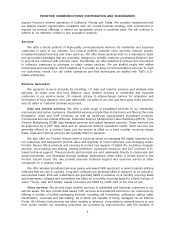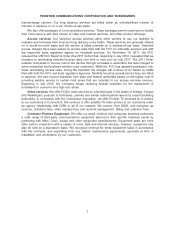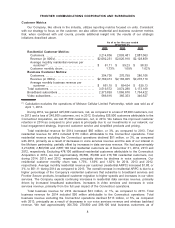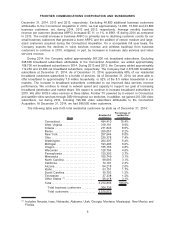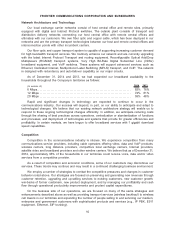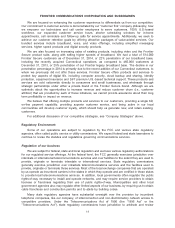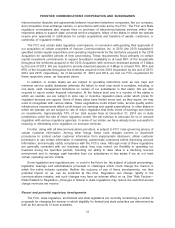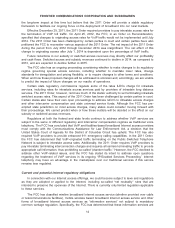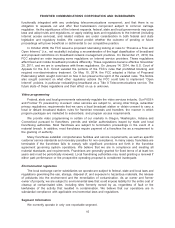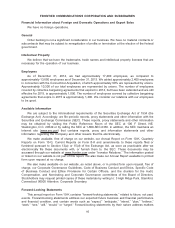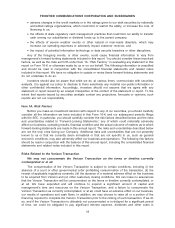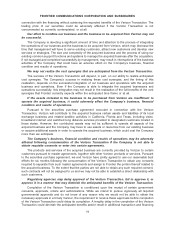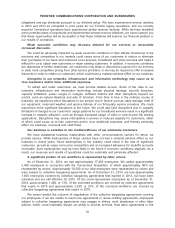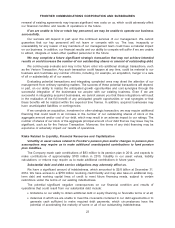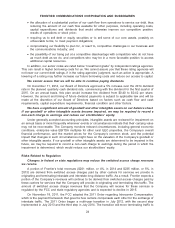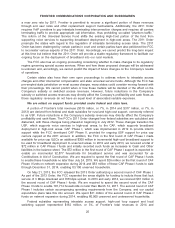Frontier Communications 2014 Annual Report Download - page 16
Download and view the complete annual report
Please find page 16 of the 2014 Frontier Communications annual report below. You can navigate through the pages in the report by either clicking on the pages listed below, or by using the keyword search tool below to find specific information within the annual report.functionally integrated with any underlying telecommunications component, and that there is no
obligation to separate out and offer that transmission component subject to common carriage
regulation. As the significance of the Internet expands, federal, state and local governments may pass
laws and adopt rules and regulations, or apply existing laws and regulations to the Internet (including
Internet access services), and related matters are under consideration in both federal and state
legislative and regulatory bodies. We cannot predict whether the outcome of pending or future
proceedings will prove beneficial or detrimental to our competitive position.
In October 2009, the FCC issued a proposed rulemaking looking at rules to “Preserve a Free and
Open Internet,” (i.e., net neutrality) including a reconsideration of the legal classification of broadband
and proposed restrictions on broadband network management practices. On December 21, 2010, the
FCC adopted an order imposing some regulations on Internet service providers. These regulations
affect fixed and mobile broadband providers differently. These regulations became effective November
20, 2011, and we are in compliance with these regulations. On January 14, 2014, the U.S. Court of
Appeals for the D.C. Circuit vacated the portions of the FCC’s rules that prohibited blocking and
required non-discriminatory treatment. On May 15, 2014, the FCC adopted a Notice of Proposed
Rulemaking which sought comment on how it can preserve the spirit of the vacated rules. The Notice
also sought comment on what other regulatory actions the FCC could take to implement “Open
Internet” policies, in particular reclassifying broadband as a Title II Telecommunications service. The
future state of these regulations and their effect on us is unknown.
Video programming
Federal, state and local governments extensively regulate the video services industry. Our FiOS
and Frontier TV powered by U-versevideo services are subject to, among other things, subscriber
privacy regulations; requirements that we carry a local broadcast station or obtain consent to carry a
local or distant broadcast station; rules for franchise renewals and transfers; the manner in which
program packages are marketed to subscribers; and program access requirements.
We provide video programming in certain of our markets in Oregon, Washington, Indiana and
Connecticut pursuant to franchises, permits and similar authorizations issued by state and local
franchising authorities. Most franchises are subject to termination proceedings in the event of a
material breach. In addition, most franchises require payment of a franchise fee as a requirement to
the granting of authority.
Many franchises establish comprehensive facilities and service requirements, as well as specific
customer service standards and monetary penalties for non-compliance. In many cases, franchises are
terminable if the franchisee fails to comply with significant provisions set forth in the franchise
agreement governing system operations. We believe that we are in compliance and meeting all
material standards and requirements. Franchises are generally granted for fixed terms of at least ten
years and must be periodically renewed. Local franchising authorities may resist granting a renewal if
either past performance or the prospective operating proposal is considered inadequate.
Environmental regulation
The local exchange carrier subsidiaries we operate are subject to federal, state and local laws and
regulations governing the use, storage, disposal of, and exposure to hazardous materials, the release
of pollutants into the environment and the remediation of contamination. As an owner and former
owner of property, we are subject to environmental laws that could impose liability for the entire cost of
cleanup at contaminated sites, including sites formerly owned by us, regardless of fault or the
lawfulness of the activity that resulted in contamination. We believe that our operations are in
substantial compliance with applicable environmental laws and regulations.
Segment Information
We currently operate in only one reportable segment.
15
FRONTIER COMMUNICATIONS CORPORATION AND SUBSIDIARIES


